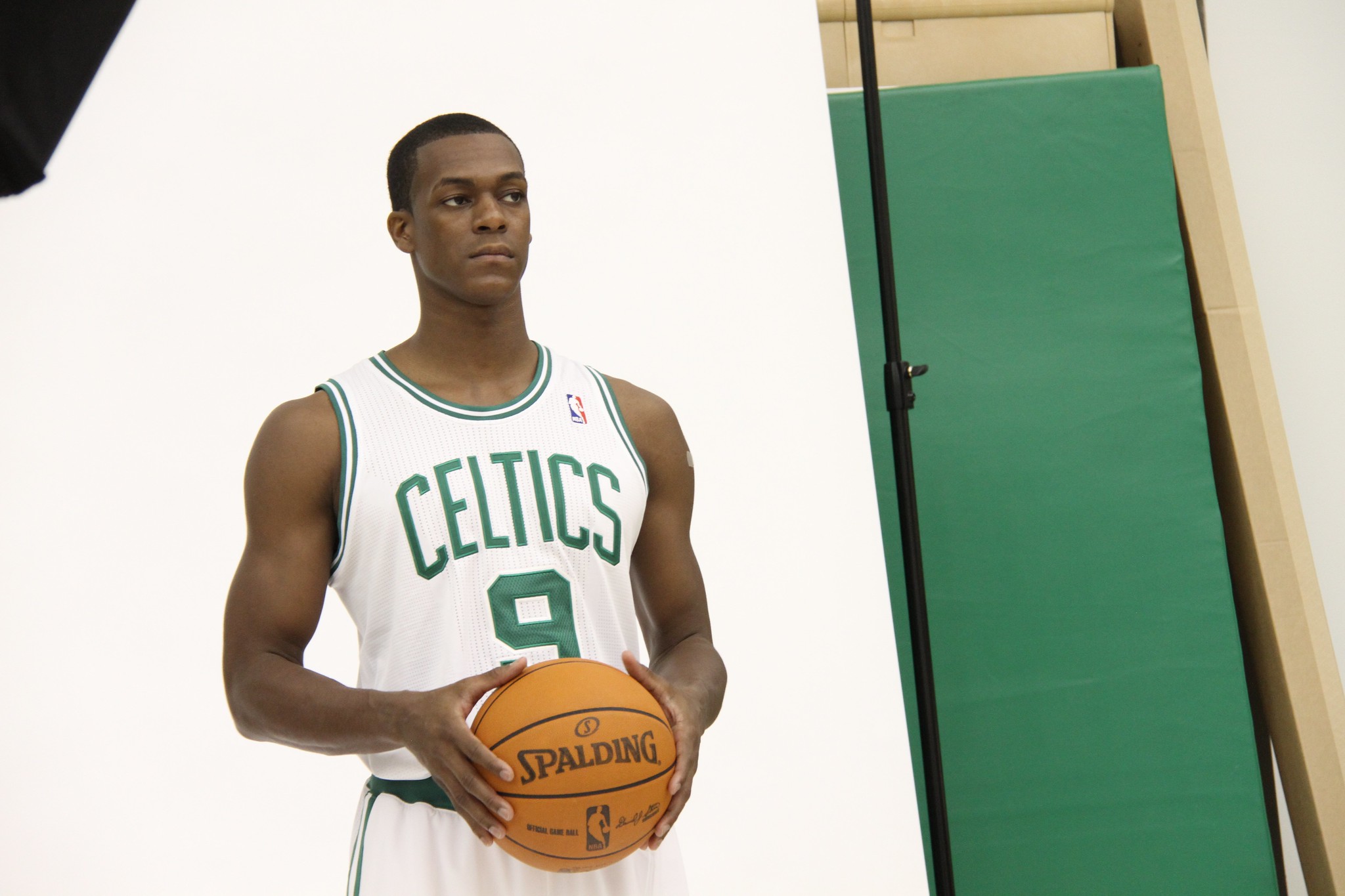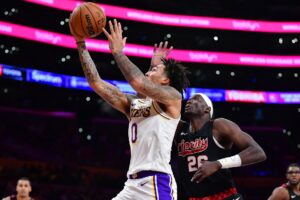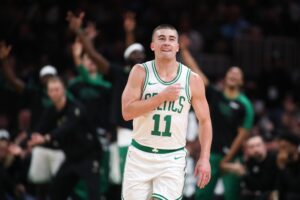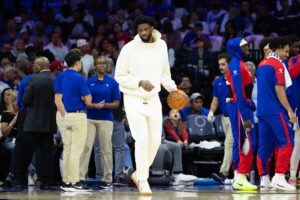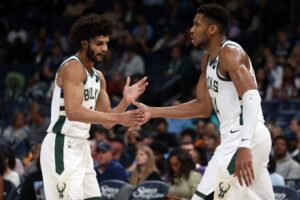Drafted by the Phoenix Suns with the 21st pick in the 2006 NBA Draft, Rajon Rondo immediately made his presence felt in the NBA. After a trade to the Boston Celtics on draft night, the Kentucky alum was named to the NBA All-Rookie Second team in 2007 and was the starting point guard of the championship team in 2008.
Rondo saw a lot of success with the Celtics and quickly became a top-tier point guard in the league.
The Louisville native eventually became a four-time All-Star in Boston, along with many other accolades. Nicknamed “Playoff Rondo,” the Celtics had someone who could take control of the game whenever he chose, especially in the postseason.
In January 2013, Rondo tore his ACL. He was ruled out for the rest of the year. Almost exactly a year later, Rondo returned and recorded eight points and four assists in a 104–107 loss to the Los Angeles Lakers.
After a successful career in Boston, the Celtics decided to trade Rajon Rondo to the Dallas Mavericks in 2014. Rondo was the last player remaining from the 2008 championship Celtics team.
Did the Celtics make a mistake trading their franchise point guard? How did the Mavericks team change after getting Rondo?
Nearly nine years later, Rondo is all but done playing in the NBA. Now seems like the best time to go back and look into the trade that sent Rondo to Dallas.
Boston Celtics Trade Throwback #2: Rajon Rondo to Mavericks
Full Trade Details
Boston Celtics trade: Rajon Rondo and Dwight Powell
Dallas Mavericks trade: Jae Crowder, Jameer Nelson, Brandan Wright, a 2015 first-round pick (later became Guerschon Yabusele), and a 2016 second-round pick (later became Demetrius Jackson)
Why the Boston Celtics Made the Trade
The Celtics were surely in a re-tooling phase.
After trading longtime stars Paul Pierce and Kevin Garnett to the Brooklyn Nets on draft night in 2013, the 2013-14 season marked the first season after their “Big Three” era.
The Celtics finished 25-57 and didn’t come close to the playoffs.
Rondo only played and started 30 games for the Celtics. On the season, Rondo averaged 11.7 PPG, 5.5 RPG, and 9.8 APG.
The “star” of the season was Jeff Green. Expected to be Rondo’s partner-in-crime during this new era of Celtics basketball, Green played and started all 82 games. This was Green’s second season following his heart surgery that caused him to miss the entire 2011-12 season.
Green averaged 16.9 PPG and 4.6 RPG on 41.4 FG%, including 34.1% from beyond the arc.
Although there was hope that Rondo and Green could help bring in a new era of Celtics basketball, this simply wasn’t the case.
At the time of the trade, the Celtics sat at 9-14 in the standings. The team was ninth in the Eastern Conference.
Rajon Rondo had been in trade rumors for many years up to this point, but this felt like the right time for the Celtics to finally pull the trigger and trade their franchise point guard to the Mavericks.
In 2014, Rondo was 28 years old and was going to be a free agent at the end of the year. The Celtics had also just drafted Marcus Smart with the sixth pick in the draft.
Pair this with “Mr. Triple Double” clearly having lost a step after his ACL injury, and it made sense for the Celtics not to gamble and pay the point guard big money.
Why the Dallas Mavericks Made the Trade
The story for the Mavericks was a little different in 2014.
Unlike the Celtics, the Mavericks made it to the playoffs the season before. They got knocked out in the first round by the San Antonio Spurs, the eventual champions, however.
At this point, the Mavericks were just a few years removed from an NBA Finals win over the Miami Heat—their first and so far only title in team history.
Instead of committing to a rebuild like the Celtics were on pace to do, the Mavericks were still in the playoff race.
The Mavericks were 19-8 and sixth in the Western Conference. Plus, with star Dirk Nowitzki being 36 years old at this point, it was clear that Dallas was in win-now mode.
In a loaded conference, the Mavericks were looking to beef up their roster and move ahead in the standings. And, without having a true point guard after Jason Kidd went to the New York Knicks, there was a clear hole the Mavericks needed to fill.
Aftermath of the trade
Let’s not sugarcoat this–anyone who watched the NBA in 2014 knows that this trade turned out to be a disaster for the Mavericks.
However, although the Rondo experience wasn’t a fun one for the Mavericks, it wasn’t all bad for them.
Before getting into that, though, let’s talk about what the rest of the season looked like for both teams involved.
Boston Celtics
The Celtics weren’t done making moves after trading Rondo away.
In January 2015, the Celtics traded Green to the Memphis Grizzlies. Then, just a month later, the Celtics traded Marcus Thornton to the Suns in a three-team trade that saw Boston land Isaiah Thomas (and Jonas Jerebko and Gigi Datome, for what it’s worth).
The Celtics ended the season with a 40-42 record and actually managed to sneak into the playoffs as the seventh seed before getting swept in the first round by the Cleveland Cavaliers.
For most teams, it is expected to hit a learning curve and maybe take a step back after trading your long-time franchise point guard away. In this case, however, the Celtics had other plans.
The story of the 2014-15 Celtics started in disappointment but ended much more positively.
We didn’t know it yet, but the Celtics had traded for their next franchise star at the trade deadline in 2014. And despite having not started a single game for the team this season, it was evident that “the little guy” was going to be fun to watch in Boston.
If the Celtics hadn’t traded Rondo when they did, it’s unlikely the team would’ve had a role for the 5’9″ guard if they would’ve ever acquired him anyway.
Jae Crowder
As for the players directly involved in this trade, none were more successful from the Celtics’ side than Jae Crowder.
Jae Crowder became one of the best 3-and-D players in the league after his trade to the Celtics and spent parts of three seasons with the team. In fact, of all the players the Celtics got from this trade, Jae Crowder is the only one that spent at least one full season in Boston.
In 202 total games, which included 162 starts, the Marquette alum averaged 12.8 PPG and 5.2 RPG on 44.4 FG%, including 35.3 3pt%.
Jae Crowder would eventually be part of a trade trade in 2017 to the Cavaliers that sent Kyrie Irving to the Celtics. Crowder has made two NBA Finals appearances since then.
The 2012 second-round pick is still a decent bench contributor and is currently a member of the Milwaukee Bucks, but his peak was very clearly as a member of the Celtics.
Jameer Nelson
Jameer Nelson‘s time in Boston was forgettable.
The former first-rounder played in just six games for the Celtics and started one game. To be fair though, Nelson did play pretty well in his one start.
On December 23, 2014, against his former team, the Orlando Magic, the former All-Star dropped nine points and recorded 11 assists in nearly 30 minutes of playing time.
Less than a month later, the Celtics made a trade that sent Nelson to the Denver Nuggets for Nate Robinson. Denver waived Nelson in October 2017.
The former Celtic played 50 total games during the 2017-18 season between the New Orleans Pelicans and Detroit Pistons but started no games and was just a role player.
Brandan Wright
Much like Nelson, Brandan Wright wasn’t too notable with the Celtics.
The big man played in eight games with the Celtics before getting shipped out to Phoenix for a 2016 second-round pick (later became Rade Zagorac) and a 2017 second-round pick (later became Semi Ojeleye). In those eight games, Wright averaged 3.3 PPG, 2.1 RPG, and 1 APG.
Wright played in 40 games for the Suns before making his way to the Grizzlies.
The UNC alum then played with the Rockets for one game in 2018. Houston waived Wright shortly after.
Wright never appeared in an NBA game again.
Dallas Mavericks
Just like the Celtics, the Mavericks made their way to the playoffs with a 50-32 record.
The Mavericks fell to the seventh seed in a stacked conference. Interestingly, Dallas would’ve been tied for the third seed with the Chicago Bulls in the Eastern Conference.
Just like the Celtics, the Mavericks got bounced out during the first round by the Rockets in five games.
Needless to say, the rest of the season was a disappointment for Dallas. So what happened?
Well, in a nutshell, this move was not the way to push them to another level.
After the Rajon Rondo and Dwight Powell trade, the Mavericks finished 31-24. This definitely isn’t a bad record by any stretch. However, considering the hot start they were on, it’s a little disappointing to think that the team barely made the playoffs even after adding Rondo.
Rajon Rondo
It’s tough to say what truly happened from the outside looking in. However, many reports have come to light since Rondo’s time in Dallas officially ended.
Reports suggested that Rondo and head coach Rick Carlisle didn’t have the best relationship. Carlisle even went as far and said the deal shouldn’t have happened.
It’s also been reported that Rondo didn’t have a great attitude while in Dallas and that there was a mutual decision to bench the former All-NBA guard during Game 2 against the Rockets (the Mavericks rolled with J.J Barea for the remainder of the round).
The team didn’t want Rondo’s negative attitude rubbing off on other players. Plus, his play in Dallas wasn’t worth the headache.
In his lone season with the Mavericks, Rondo averaged 9.3 PPG and 6.5 APG on 43.6 FG%.
Less than a year after his trade to the Mavericks, Rajon Rondo left for the Sacramento Kings in 2015.
In Sacramento, Rondo had a small career resurgence and was even the assists leader that season.
Rondo never found a big role like the one he had in Boston again. However, he made a new career as a steady bridge point guard.
The 2010 steals leader bounced around and played for six teams after leaving the Kings in 2017. This includes two separate stints with the Lakers, the team he won his second championship with in 2020.
Rondo was last on the Cavaliers in 2022. No team has signed him since.
At 37 years old, it is likely that we won’t see Rondo suit up for another NBA team.
Dwight Powell
Amazingly, Dwight Powell is still a member of the Mavericks nine years after the trade. In fact, the 32-year-old re-signed with the team this past offseason.
Dwight Powell was essentially just a throw-in piece in the trade. However, the Stanford alum has made himself a career with the Mavericks.
Powell didn’t see much playing time immediately after the trade to Dallas. The big man also split time with the Texas Legends, the Mavericks’ then D League affiliate. However, he found a role with the team during the 2015-16 season and hasn’t looked back.
In nine total seasons with the Mavericks, Powell averages 7.6 PPG and 4.5 RPG on 59.9 FG%.
Sure, Powell isn’t the second coming of Dirk. However, he’s been a good role player for the Mavericks. Powell was also one of just four players to play in all 82 games during the 2021-22 season.
Even just last season, Powell played in 76 games and started 64. Dwight Powell has definitely exceeded expectations in Dallas after the trade.
Verdict
Again, let’s not beat around the bush–the Celtics won this trade. However, it isn’t that black and white.
Rajon Rondo was gone from the Mavericks at season’s end after the trade. However, Jameer Nelson and Brandan Wright were both barely Celtics to celebrate the New Year after the trade.
So in essence, this trade between the Celtics and Mavericks was just Jae Crowder for Dwight Powell.
Dwight Powell has been good with the Mavericks after the trade, but his highs don’t even come close to Crowder’s.
The 33-year-old became a top-tier 3-and-D player, albeit for only about three years with the Celtics.
Jae Crowder was also one of the biggest pieces that brought Irving to the Celtics in the blockbuster trade in 2017 (but let’s save this for a discussion for another time).
The idea of the trade was really good on paper. Dallas needed to add one more player to move up the ranks in the Western Conference. And on the other hand, the Celtics needed to commit to the rebuild.
The trade didn’t turn out the way everyone thought it would in 2014. Even so, at least both teams can be a little satisfied with the outcome.


